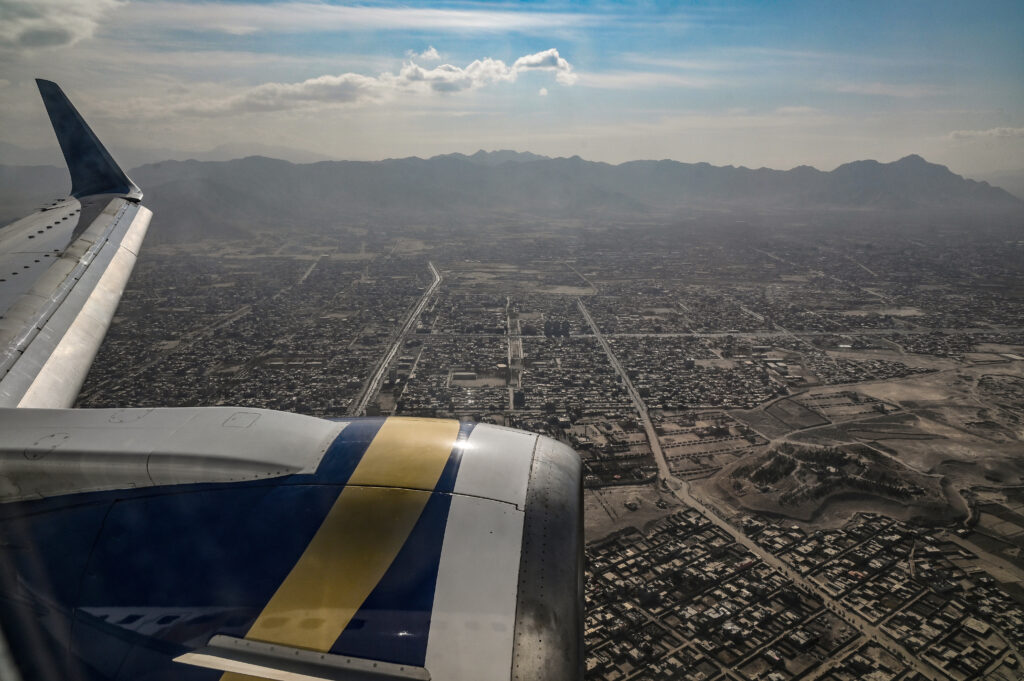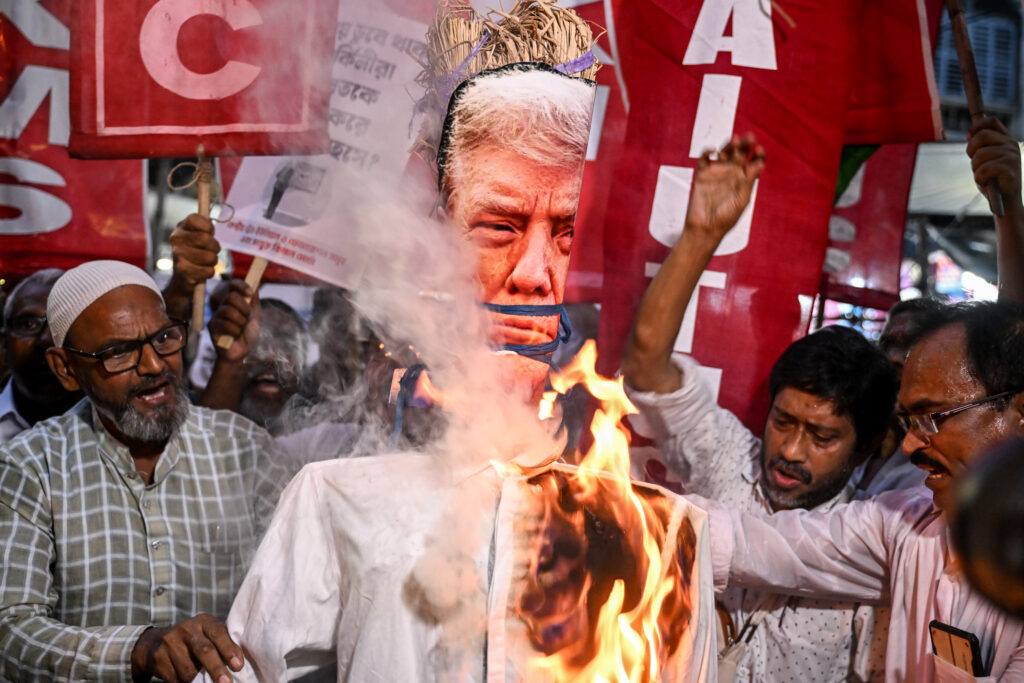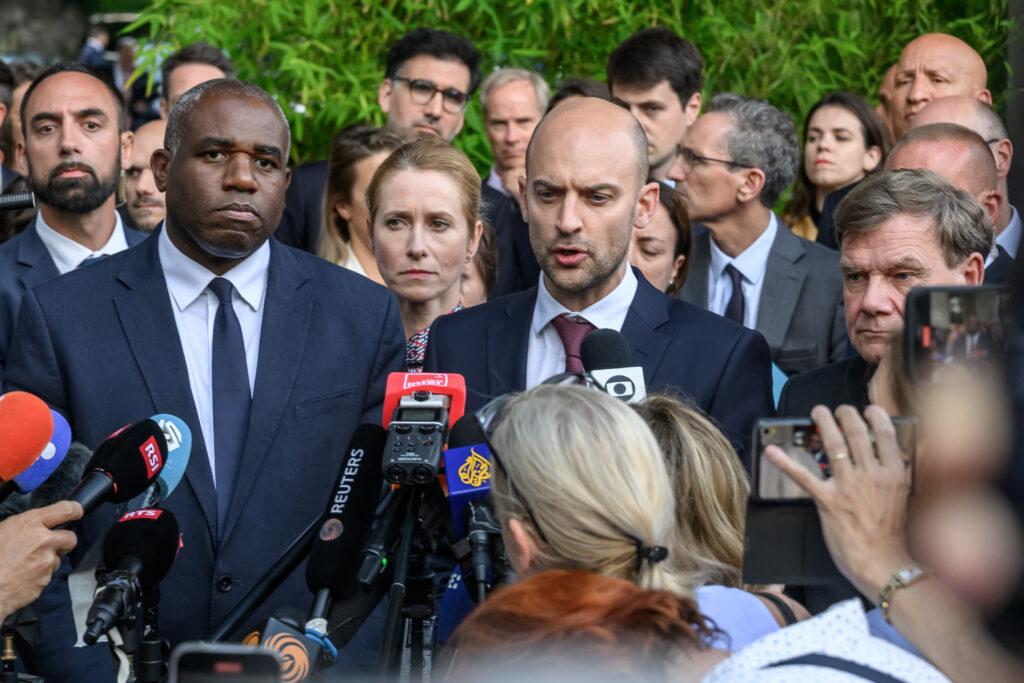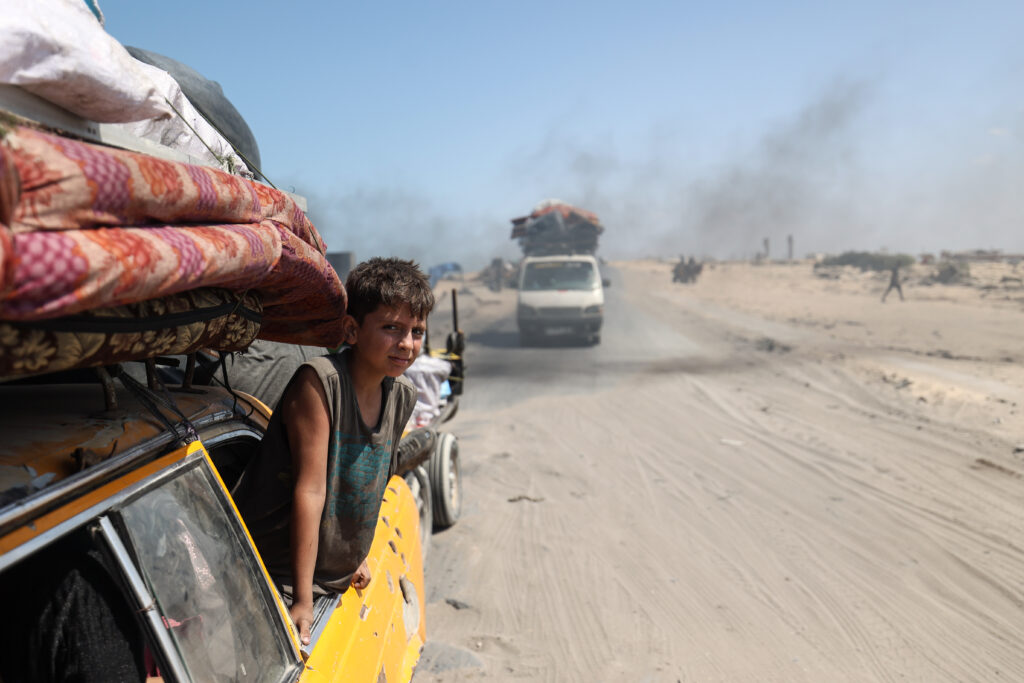AFP Asia Business
Cash-strapped Taliban look to airspace for windfall
Far above Kabul, the cash-strapped Taliban government has located a potentially lucrative revenue stream: Afghanistan’s airspace. As Israel and Iran’s exchange of missiles threw flight paths into disarray this year, the skies above Afghanistan offered carriers a less turbulent and faster route to ply — for a flat $700 overflight fee, according to industry insiders.The US …
Cash-strapped Taliban look to airspace for windfall Read More »
Trump thumbs nose at decades of India courtship
India once united US policymakers like few issues. For nearly three decades, US presidents of both parties courted New Delhi as an emerging ally, politely overlooking disagreements for the sake of larger goals.Donald Trump has abruptly changed that.The US administration on Wednesday slapped 50 percent tariffs on many Indian products as Trump seeks to punish …
US stocks reach new peaks as investors digest US GDP
Two of Wall Street’s major indexes closed at record highs Thursday, lifted by an upward revision to second-quarter US GDP data and strong earnings from AI chip giant Nvidia.The Dow Jones Industrial Average rose 0.16 percent to a record 45,636.90, while the broad-based S&P 500 Index gained 0.32 percent to 6,501.86, also a record. The Nasdaq …
US stocks reach new peaks as investors digest US GDP Read More »
Europe powers move to reimpose Iran sanctions over nuclear drive
France, Britain and Germany on Thursday triggered a mechanism to reimpose United Nations sanctions on Iran for failing to comply with commitments over its nuclear programme it agreed to a decade ago.Iran warned that it would “respond appropriately” to the move, which risks ending the most sustained diplomatic push for a peaceful solution to the Iranian nuclear crisis.The United States welcomed the step, while emphasising it was ready for “direct engagement” with the Islamic republic with which Washington has had no diplomatic relations since shortly after the 1979 Islamic revolution.The foreign ministers of France, Britain and Germany said they “hereby invoke the process known as the ‘snapback’ mechanism,” which initiates a 30-day process for reimposing sanctions suspended a decade ago.The three countries notified the UN Security Council that they “believe Iran to be in significant non-performance of its commitments” under the 2015 nuclear deal, according to a letter seen by AFP.The move comes just over two months after the end of a 12-day war between Israel and Iran which Israel said was aimed at degrading Tehran’s nuclear as well as ballistic capabilities and also saw the US launch its first strikes on the Islamic republic.It also comes as the window for triggering the so-called snapback mechanism closes on October 18.The UN Security Council, where France and Britain as well as the United States have permanent seats alongside China and Russia, is to meet on Friday to discuss Iran, diplomatic sources said.Russia’s deputy ambassador to the UN, Dmitry Polyanskiy, told journalists Thursday that the Europeans’ move “has absolutely no legal bearing.” Western powers have for two decades feared that Iran is seeking a nuclear weapon under the guise of an atomic energy programme, a charge vehemently denied by Tehran.UN Secretary-General Antonio Guterres’s office urged Iran and major powers Thursday to seize the moment and strike a deal.”In the next 30 days, there is a window of opportunity to avoid any further escalation and find a way forward that serves peace,” Guterres spokesman Stephane Dujarric said.- ‘Direct engagement’ -Iran has previously warned that cooperation with the UN nuclear watchdog would be affected if the mechanism was triggered.”The Islamic Republic of Iran will respond appropriately to this illegal and unjustified action by the three European countries, in order to protect and guarantee its national rights and interests,” Foreign Minister Abbas Araghchi told his French, British and German counterparts in a phone call, his ministry said.The Iranian foreign ministry said the “provocative and unnecessary escalation” will “seriously undermine the ongoing process of interaction and cooperation” between Iran and the International Atomic Energy Agency.Iran has already suspended its cooperation with the IAEA, accusing the UN agency of failing to condemn the Israeli and US attacks.IAEA inspectors have begun work at the key nuclear site of Bushehr in southwestern Iran, the first team to enter the country since Tehran formally suspended its cooperation last month.Tehran stressed this did not represent a full resumption of cooperation.US Secretary of State Marco Rubio said Washington “remains available for direct engagement with Iran” in a bid to reach a lasting resolution. “Snapback does not contradict our earnest readiness for diplomacy, it only enhances it,” Rubio said in a statement. Israel welcomed the move, with its UN ambassador Danny Danon calling it “an important step on the way to stopping the Iranian nuclear program.”Analysts say Israel’s strikes on Iran appear to have caused some damage to infrastructure but did not obliterate the atomic programme with much of the enriched uranium still unaccounted for.- ‘Unprecedented’ -In a joint statement, British Foreign Minister David Lammy, Germany’s top diplomat Johann Wadephul and French counterpart Jean-Noel Barrot said Iran’s non-compliance with the 2015 nuclear deal was “clear and deliberate”.They said Iran has “no civilian justification” for its high enriched uranium stockpile.Such a stockpile remains “a clear threat” to peace and security and “is unprecedented for a state without a nuclear weapons programme”, they said.Barrot wrote on X that “Iran’s nuclear escalation must not go any further” but emphasised the move “does not signal the end of diplomacy”.The 2015 treaty was aimed at resolving the standoff over Iran’s nuclear activities which had escalated ever since secret nuclear facilities were uncovered at the start of the 2000s.But it was badly weakened when US President Donald Trump left the accord during his first mandate, and as subsequent accusations of Iranian non-compliance multiplied.
UN chief condemns ‘endless’ Gaza horrors as Israel presses offensive
UN Secretary-General Antonio Guterres on Thursday condemned the “endless catalogue of horrors” in Gaza after nearly two years of war, while the territory’s civil defence reported dozens killed by Israel.Israel, whose military is preparing to conquer Gaza City, is under mounting pressure at home and abroad to end its offensive in the Palestinian territory, where the United Nations has declared a famine.The vast majority of Gaza’s population of more than two million people has been displaced at least once during the war, with aid groups on the ground warning against expanding the military campaign.”Gaza is piled with rubble, piled with bodies and piled with examples of what may be serious violations of international law,” Guterres told journalists on Thursday, calling for accountability.On the ground on Thursday, AFP footage showed massive clouds of smoke rising into the sky above Gaza City after Israeli bombardments of the outskirts of the territory’s largest city.Aya Daher, who was displaced from Gaza City’s Zeitoun district, told AFP she had no shelter and was sitting outside a local hospital “just waiting for God’s mercy”.”There were explosions all night. I was injured, my husband was injured by shrapnel, and my son was also wounded in the head. Thank God we survived, but there were martyrs,” she said.- Heading south -Gaza’s civil defence agency said that Israeli strikes and gunfire killed at least 40 people across the territory on Thursday, including six shot while waiting for aid in the south.When asked for comment by AFP, the Israeli military said it needed precise times and coordinates to look into the reports.Media restrictions in Gaza and difficulties in accessing many areas mean AFP is unable to independently verify the tolls and details provided by the civil defence agency or the Israeli military.In a statement on Thursday, the military said it was preparing to “expand operations against Hamas in Gaza City”, while COGAT, the defence ministry body that oversees civil affairs in the Palestinian territories, said it was undertaking preparations “for moving the population southward for their protection”.AFP photos from the centre of Gaza showed lines of Palestinians fleeing south in vans and cars piled high with mattresses, chairs and bags.The UN estimates that nearly a million people currently live in Gaza governorate, which includes Gaza City and its surroundings in the north of the territory.Israel’s far-right Finance Minister Bezalel Smotrich meanwhile said that so long as Hamas refuses to disarm, the Israeli government should annex parts of the Gaza Strip after Palestinian civilians leave them.Hamas in response condemned “an open endorsement of… ethnic cleansing.”- ‘Breaking point’ -The head of the UN’s World Food Programme, Cindy McCain, warned that Gaza was “at breaking point” and appealed for the urgent revival of its network of 200 food distribution points.After a visit to the territory, McCain said she saw first-hand that “desperation is soaring”.The UN declared a famine in Gaza governorate last week, blaming “systematic obstruction” by Israel of humanitarian aid deliveries.Israel has severely restricted the aid allowed into Gaza and at times completely cut it off during its offensive against Hamas, whose October 2023 attack against southern Israel triggered the war.Once Israel began to ease restrictions in late May, after a more than two-month blockade, the private US- and Israel-backed Gaza Humanitarian Foundation (GHF) was established to distribute food aid, effectively sidelining UN agencies.Distribution has been marred by chaotic scenes, with frequent reports of starving Palestinians being shot while waiting to collect aid at one of its four distribution sites.UN rights experts voiced alarm Thursday at reports of “enforced disappearances” at GHF sites, but the organisation said there was “no evidence” of such disappearances at its aid points.The Hamas attack that sparked the war resulted in the deaths of 1,219 people, mostly civilians, according to an AFP tally based on Israeli figures.Israel’s retaliatory offensive has killed at least 62,966 Palestinians, most of them civilians, according to figures from the health ministry in Hamas-run Gaza that the UN considers reliable.





